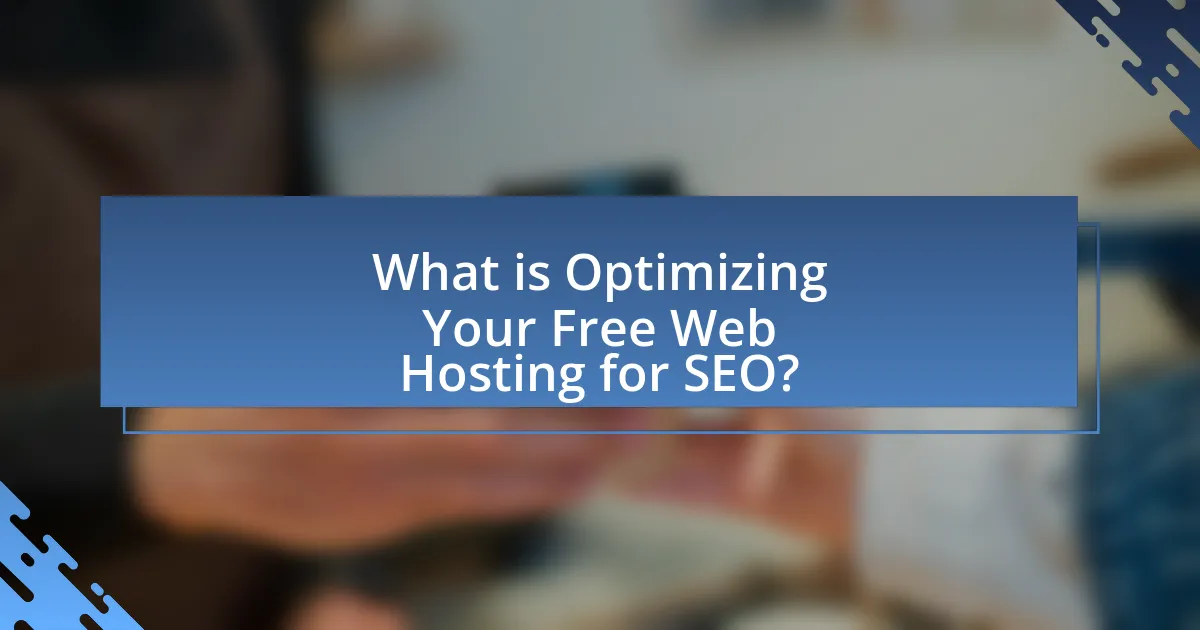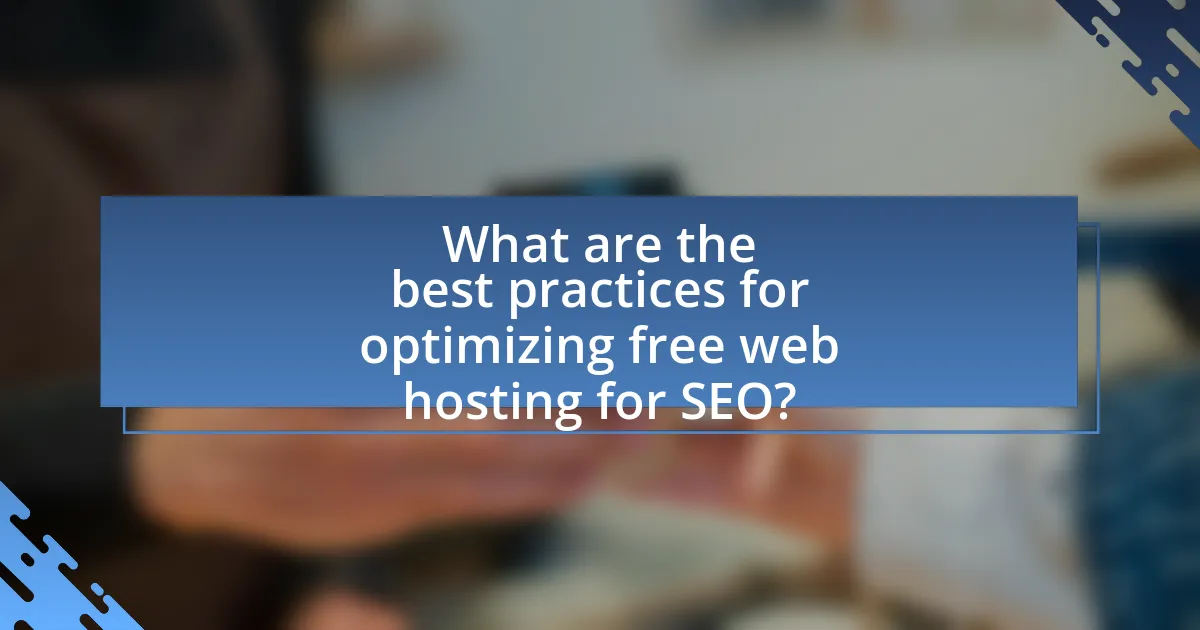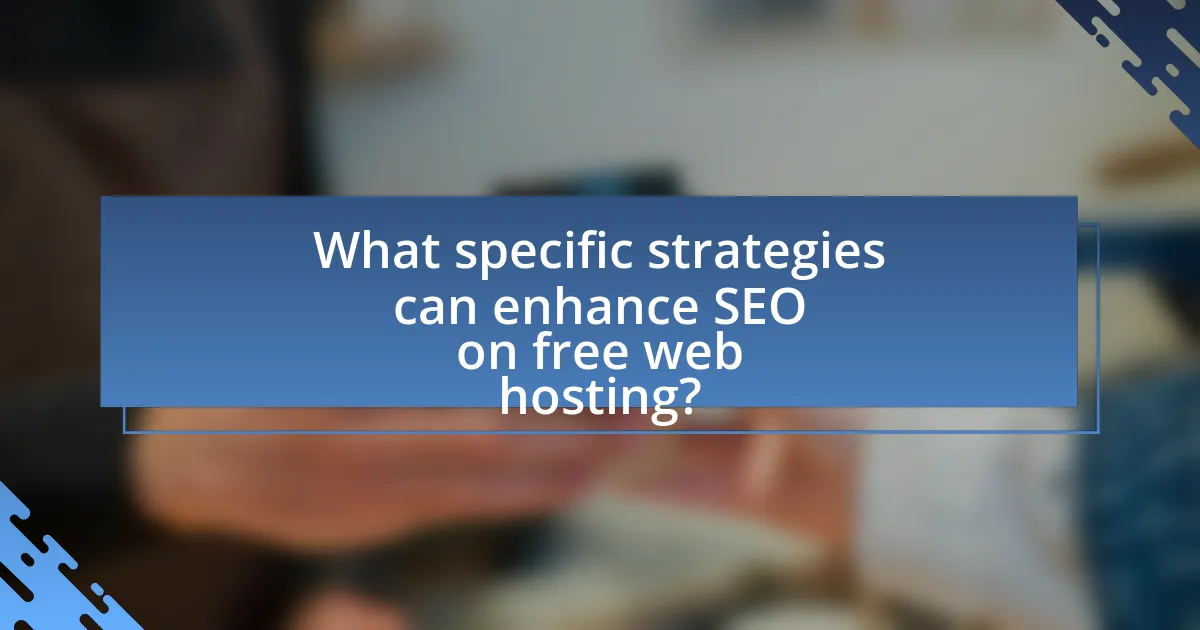Optimizing your free web hosting for SEO is essential for enhancing website visibility in search engine results. This article outlines the impact of free hosting on SEO performance, highlighting limitations such as slower loading speeds, lack of custom domains, and mobile optimization challenges. Key strategies for improvement include using a custom domain, optimizing site speed, implementing effective keyword usage, and building quality backlinks. Additionally, the article emphasizes the importance of technical SEO aspects and provides practical tips to enhance overall site performance, ensuring better engagement and higher search rankings.

What is Optimizing Your Free Web Hosting for SEO?
Optimizing your free web hosting for SEO involves configuring your website and hosting environment to improve its visibility in search engine results. This includes selecting a reliable free hosting provider that offers good uptime, fast loading speeds, and minimal downtime, as these factors directly influence search engine rankings. Additionally, optimizing website content with relevant keywords, ensuring mobile responsiveness, and implementing proper meta tags are essential practices. Research indicates that websites with faster loading times can improve user experience and reduce bounce rates, which are critical for SEO performance.
How does free web hosting impact SEO performance?
Free web hosting negatively impacts SEO performance due to limitations in server reliability, speed, and domain authority. Websites hosted on free platforms often experience slower loading times, which can lead to higher bounce rates and lower rankings in search engine results, as Google considers page speed a ranking factor. Additionally, free hosting services may impose restrictions on bandwidth and storage, further affecting site performance and user experience. Furthermore, free hosting typically lacks a custom domain, which diminishes credibility and trustworthiness in the eyes of search engines, ultimately hindering SEO efforts.
What are the limitations of free web hosting for SEO?
Free web hosting has several limitations that negatively impact SEO. Firstly, free hosting often results in slower loading speeds, which can lead to higher bounce rates and lower search engine rankings, as Google prioritizes fast-loading sites. Additionally, free hosting services frequently impose restrictions on bandwidth and storage, limiting the ability to handle traffic spikes and affecting user experience. Furthermore, many free hosts display ads on your site, which can detract from user engagement and credibility, ultimately harming SEO efforts. Lastly, free hosting may lack essential features like custom domain names and SSL certificates, both of which are important for building trust and improving search visibility.
How can free web hosting be optimized for better SEO results?
Free web hosting can be optimized for better SEO results by ensuring a custom domain name is used instead of a subdomain, as this enhances credibility and brand recognition. Additionally, optimizing website speed through image compression and minimizing code can improve user experience and search engine rankings. Implementing on-page SEO techniques, such as using relevant keywords in titles, headers, and meta descriptions, further boosts visibility. Regularly updating content and ensuring mobile responsiveness are also critical, as search engines prioritize sites that provide a good user experience. According to Google, page speed and mobile-friendliness are significant ranking factors, making these optimizations essential for free web hosting users aiming for better SEO outcomes.
Why is SEO important for websites on free hosting?
SEO is important for websites on free hosting because it enhances visibility and drives organic traffic despite the limitations often associated with free hosting services. Websites on free hosting typically face challenges such as lower credibility and limited resources, making effective SEO strategies crucial for competing in search engine rankings. According to a study by HubSpot, 75% of users never scroll past the first page of search results, highlighting the necessity for free-hosted sites to optimize their content to appear prominently in search results. By implementing SEO best practices, such as keyword optimization and quality content creation, these websites can improve their chances of attracting visitors and achieving better engagement, ultimately leading to increased success.
What are the key SEO factors that affect website visibility?
The key SEO factors that affect website visibility include keyword optimization, site structure, mobile-friendliness, page load speed, and backlinks. Keyword optimization ensures that relevant terms are used throughout the content, which helps search engines understand the topic. A well-organized site structure enhances user experience and allows search engines to crawl the site effectively. Mobile-friendliness is crucial as over 50% of global web traffic comes from mobile devices, making it essential for ranking. Page load speed impacts user retention; studies show that a one-second delay can reduce conversions by 7%. Lastly, backlinks from reputable sites signal authority and relevance to search engines, significantly boosting visibility.
How does SEO influence traffic and user engagement?
SEO significantly influences traffic and user engagement by improving a website’s visibility in search engine results, leading to increased organic traffic. When a website ranks higher for relevant keywords, it attracts more visitors who are actively searching for related content, products, or services. According to a study by HubSpot, 75% of users never scroll past the first page of search results, highlighting the importance of SEO in capturing user attention. Furthermore, effective SEO practices, such as optimizing page load speed and enhancing user experience, contribute to higher engagement rates, as users are more likely to stay on and interact with a site that loads quickly and provides valuable content. This correlation between SEO and user engagement is supported by research from Moz, which indicates that higher rankings lead to increased click-through rates and longer time spent on site, ultimately fostering a more engaged audience.

What are the best practices for optimizing free web hosting for SEO?
To optimize free web hosting for SEO, focus on selecting a reliable hosting provider that offers good uptime and speed. A stable hosting service ensures that your website remains accessible, which is crucial for search engine rankings. Additionally, utilize SEO-friendly URL structures and meta tags to enhance visibility. Implementing responsive design improves user experience on mobile devices, which is a ranking factor for search engines. Regularly updating content and optimizing images can also boost loading times and engagement. According to Google, page speed is a significant ranking factor, making it essential to optimize your site for faster loading.
How can you improve site speed on free web hosting?
To improve site speed on free web hosting, optimize images and leverage browser caching. Optimizing images involves compressing them to reduce file size without sacrificing quality, which can significantly decrease load times. Leveraging browser caching allows frequently accessed resources to be stored locally on users’ devices, reducing the need to fetch them from the server repeatedly. According to Google, optimizing images can lead to a 50-80% reduction in load time, while effective caching strategies can improve site performance by up to 60%.
What tools can help analyze and enhance site speed?
Google PageSpeed Insights is a tool that can analyze and enhance site speed effectively. This tool provides insights into the performance of a webpage on both mobile and desktop devices, offering specific recommendations for improvement. For instance, it evaluates factors such as image optimization, server response times, and JavaScript execution, which are critical for enhancing loading speeds. Additionally, GTmetrix is another valuable tool that combines Google Lighthouse and WebPageTest, providing detailed reports on page load times and suggestions for optimization. These tools are widely recognized in the industry for their accuracy and actionable insights, making them essential for anyone looking to improve site speed.
How does site speed affect SEO rankings?
Site speed significantly affects SEO rankings because search engines prioritize fast-loading websites in their algorithms. A study by Google found that as page load time increases from one to three seconds, the probability of a user bouncing increases by 32%. Additionally, websites that load in under two seconds have a higher chance of ranking well in search results. This correlation between site speed and user experience directly influences search engine rankings, as faster sites tend to have lower bounce rates and higher engagement metrics, which are critical factors in SEO performance.
What role does mobile optimization play in SEO for free hosting?
Mobile optimization is crucial for SEO in free hosting because search engines prioritize mobile-friendly websites in their rankings. As of 2021, Google uses mobile-first indexing, meaning it predominantly uses the mobile version of a site for indexing and ranking. This shift emphasizes the need for websites, including those on free hosting platforms, to be responsive and provide a seamless user experience on mobile devices. A study by Statista indicated that over 50% of global web traffic comes from mobile devices, reinforcing the importance of mobile optimization for attracting and retaining visitors. Therefore, effective mobile optimization directly impacts visibility and user engagement, which are essential for successful SEO in free hosting environments.
How can you ensure your site is mobile-friendly?
To ensure your site is mobile-friendly, implement responsive web design, which automatically adjusts the layout based on the device’s screen size. This approach is validated by Google’s recommendation that responsive design is the preferred method for mobile optimization, as it enhances user experience and improves SEO rankings. Additionally, using tools like Google’s Mobile-Friendly Test can help assess and confirm your site’s mobile compatibility, ensuring it meets the necessary standards for mobile usability.
What are the consequences of not optimizing for mobile users?
Not optimizing for mobile users leads to significant consequences, including decreased user engagement and higher bounce rates. Research indicates that 53% of mobile users abandon sites that take longer than three seconds to load, which directly impacts traffic and conversion rates. Additionally, Google prioritizes mobile-friendly websites in its search rankings; thus, failure to optimize can result in lower visibility in search results, ultimately reducing organic traffic. Furthermore, a poor mobile experience can damage brand reputation, as users associate website performance with overall brand quality.

What specific strategies can enhance SEO on free web hosting?
To enhance SEO on free web hosting, focus on optimizing website content, improving site speed, and utilizing backlinks. Optimizing website content involves using relevant keywords strategically throughout the text, headings, and meta descriptions, which helps search engines understand the site’s purpose. Improving site speed can be achieved by compressing images and minimizing code, as faster-loading sites rank better in search results. Utilizing backlinks from reputable sites increases domain authority, which is crucial for SEO performance. According to a study by Moz, backlinks are one of the top ranking factors for search engines, reinforcing the importance of this strategy.
How can you effectively use keywords for SEO on free hosting?
To effectively use keywords for SEO on free hosting, focus on integrating relevant keywords into your website’s content, meta tags, and URLs. This approach enhances visibility in search engine results. Research indicates that using targeted keywords in headings and throughout the text can improve rankings; for instance, a study by Moz found that on-page keyword optimization significantly correlates with higher search engine rankings. Additionally, utilizing free tools like Google Keyword Planner can help identify high-traffic keywords relevant to your niche, ensuring that your content aligns with user search intent.
What tools can assist in keyword research for free hosting sites?
Google Keyword Planner is a primary tool that can assist in keyword research for free hosting sites. This tool allows users to discover keywords related to their niche, assess search volume, and analyze competition levels. Additionally, Ubersuggest provides insights into keyword suggestions, search volume, and SEO difficulty, making it useful for identifying relevant keywords for free hosting services. Another effective tool is AnswerThePublic, which visualizes search queries and questions related to specific keywords, helping to uncover user intent. These tools are widely recognized for their effectiveness in keyword research, providing valuable data to enhance SEO strategies for free hosting sites.
How should keywords be integrated into your content?
Keywords should be integrated into your content naturally and strategically to enhance SEO effectiveness. This involves placing primary keywords in key locations such as the title, headings, and throughout the body text while maintaining readability. Research indicates that content with keywords in the first 100 words ranks better, as search engines prioritize early keyword placement. Additionally, using variations and related terms can improve relevance and capture a broader audience. A study by Moz highlights that keyword optimization, when done correctly, can increase organic traffic by up to 50%.
What are the benefits of using backlinks for SEO on free hosting?
Using backlinks for SEO on free hosting enhances website visibility and authority. Backlinks from reputable sites signal to search engines that the content is valuable, which can improve rankings. Additionally, backlinks can drive referral traffic, increasing the number of visitors to the site. According to a study by Moz, backlinks are one of the top three ranking factors in Google’s algorithm, underscoring their importance in SEO strategies, even on free hosting platforms.
How can you build quality backlinks for your free hosting site?
To build quality backlinks for your free hosting site, focus on creating valuable content that attracts attention and encourages sharing. High-quality blog posts, infographics, and tutorials relevant to web hosting can naturally draw links from other websites. Additionally, engaging in guest blogging on reputable sites within the tech and hosting niche allows you to include backlinks to your site in your author bio or within the content itself.
Participating in online communities, such as forums and social media groups related to web hosting, can also help you share your expertise and link back to your site when appropriate. Collaborating with influencers or industry experts for interviews or joint content can further enhance your backlink profile.
Research shows that websites with a diverse backlink profile from authoritative sources rank higher in search engine results, making these strategies effective for improving your site’s SEO.
What are the risks associated with poor backlink strategies?
Poor backlink strategies can lead to significant risks, including penalties from search engines, decreased organic traffic, and damage to domain authority. Search engines like Google employ algorithms that assess the quality and relevance of backlinks; low-quality or spammy backlinks can trigger penalties, resulting in lower rankings or removal from search results. Additionally, a lack of credible backlinks can hinder a website’s ability to attract organic traffic, as search engines prioritize sites with strong, relevant link profiles. Furthermore, poor backlink practices can erode a site’s domain authority, making it more challenging to compete in search engine results. According to a study by Moz, websites with higher domain authority tend to rank better, highlighting the importance of maintaining a healthy backlink profile.
What common mistakes should be avoided when optimizing free web hosting for SEO?
Common mistakes to avoid when optimizing free web hosting for SEO include neglecting site speed, failing to use a custom domain, and overlooking mobile optimization. Site speed is crucial; slow-loading pages can lead to higher bounce rates and lower search rankings, as Google considers page speed a ranking factor. Using a free subdomain instead of a custom domain can diminish credibility and brand recognition, negatively impacting SEO performance. Additionally, not optimizing for mobile devices can alienate a significant portion of users, as mobile-friendliness is a key ranking criterion for search engines.
How can poor content quality affect your SEO efforts?
Poor content quality negatively impacts SEO efforts by reducing search engine rankings and user engagement. Search engines prioritize high-quality, relevant content, and when content lacks depth, accuracy, or originality, it is less likely to rank well in search results. For instance, Google’s algorithm updates, such as the Panda update, specifically target low-quality content, leading to decreased visibility for affected websites. Additionally, poor content can result in higher bounce rates, as users are less likely to stay on a page that does not meet their expectations, further signaling to search engines that the content is not valuable. This cycle of low engagement and poor rankings can severely hinder overall SEO performance.
What are the pitfalls of neglecting technical SEO aspects?
Neglecting technical SEO aspects can lead to significant pitfalls, including poor website performance, reduced search engine visibility, and a negative user experience. Websites that lack proper technical SEO may experience slow loading times, which can increase bounce rates; research indicates that a one-second delay in page load time can lead to a 7% reduction in conversions. Additionally, improper indexing and crawlability issues can prevent search engines from effectively accessing and ranking the site, resulting in lower organic traffic. Furthermore, neglecting mobile optimization can alienate a substantial portion of users, as mobile devices account for over 50% of global web traffic. These factors collectively hinder a website’s ability to compete effectively in search engine results, ultimately impacting its overall success.
What practical tips can help you optimize your free web hosting for SEO?
To optimize your free web hosting for SEO, focus on improving site speed, using clean URLs, and ensuring mobile responsiveness. Site speed is crucial as Google considers it a ranking factor; tools like Google PageSpeed Insights can help identify areas for improvement. Clean URLs enhance user experience and make it easier for search engines to crawl your site, so avoid complex parameters. Additionally, mobile responsiveness is essential since over 50% of web traffic comes from mobile devices, and Google prioritizes mobile-friendly sites in search results. Implementing these strategies can significantly enhance your site’s visibility and performance in search engines.


